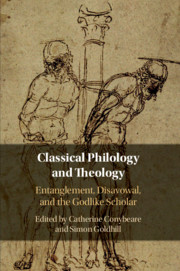Book contents
- Classical Philology and Theology
- Classical Philology and Theology
- Copyright page
- Contents
- Contributors
- Chapter 1 Philology’s Shadow
- Chapter 2 Philology’s Roommate: Hermeneutics, Antiquity, and the Seminar
- Chapter 3 The Union and Divorce of Classical Philology and Theology
- Chapter 4 The Philology of Judaism: Zacharias Frankel, the Septuagint, and the Jewish Study of Ancient Greek in the Nineteenth Century
- Chapter 5 Source, Original, and Authenticity between Philology and Theology
- Chapter 6 Whose Handmaiden? ‘Hellenisation’ between Philology and Theology
- Chapter 7 Julian the Emperor on Statues (of Himself)
- Chapter 8 Boethius in the Genres of the Book: Philology, Theology, Codicology
- Chapter 9 Virgil, Creator of the World
- Chapter 10 Theology’s Shadow
- Bibliography
- Index
Chapter 6 - Whose Handmaiden? ‘Hellenisation’ between Philology and Theology
Published online by Cambridge University Press: 03 September 2020
- Classical Philology and Theology
- Classical Philology and Theology
- Copyright page
- Contents
- Contributors
- Chapter 1 Philology’s Shadow
- Chapter 2 Philology’s Roommate: Hermeneutics, Antiquity, and the Seminar
- Chapter 3 The Union and Divorce of Classical Philology and Theology
- Chapter 4 The Philology of Judaism: Zacharias Frankel, the Septuagint, and the Jewish Study of Ancient Greek in the Nineteenth Century
- Chapter 5 Source, Original, and Authenticity between Philology and Theology
- Chapter 6 Whose Handmaiden? ‘Hellenisation’ between Philology and Theology
- Chapter 7 Julian the Emperor on Statues (of Himself)
- Chapter 8 Boethius in the Genres of the Book: Philology, Theology, Codicology
- Chapter 9 Virgil, Creator of the World
- Chapter 10 Theology’s Shadow
- Bibliography
- Index
Summary
This chapter focuses on the central question: what is the role of Greek thinking in the development of Christianity? This question is shaped by a judgment about how profoundly the revolutionary Greek texts of incipient Christianity were influenced by the Greek language and culture in which they were produced. The chapter explores three key moments in the history of Catholic engagement with the philology of Hellenization. The first is Guillaume Budé’s De transitu Hellenismi ad Christianismum, written amid the religious violence and intense arguments of the Reformation. The second is Festugière’s Observations stylistiques sur l’Évangile de Saint Jean: this is explored in relation to nineteenth- and early twentieth-century arguments about how Greek philosophy added a distorting corruption to Christianity. Third is the Regensburg Address, delivered by Pope Benedict XVI in 2006. Recalled mainly for its apparent attack on Islam, the text is more remarkable for its reversal of centuries of Catholic theology about Hellenization.
Keywords
- Type
- Chapter
- Information
- Classical Philology and TheologyEntanglement, Disavowal, and the Godlike Scholar, pp. 110 - 125Publisher: Cambridge University PressPrint publication year: 2020
- 1
- Cited by

